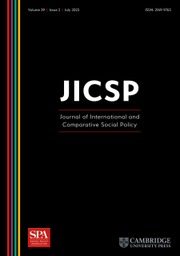Article contents
Western welfare states watched from the East during the Cold War: condemnation, competition, and creative learning
Published online by Cambridge University Press: 09 March 2020
Abstract
This paper examines international influences of the Western welfare state on social policy ideas, institutions and reforms in the Soviet bloc during the Cold War. It identifies three types of Eastern reactions to or interactions with the West: “condemnation” of various “bourgeois” conceptions of social welfare; “competition” or increased attention to redistribution and social needs of the population stemming from the demonstrable successes of Western welfare states; and “creative learning” or implicit acknowledgment that every industrial society, including the Soviet style centrally planned economies, had to adopt at least some elements of modernized social welfare models or policy originally developed in the West. Paradoxically, first the explicit and later more implicit rejection of the Western welfare state, including the social-democratic and various “third way” models, eventually led to the rise of neoliberal and anti-welfare attitudes among many Eastern social policy reformers during the last decade of communist rule and beyond, after 1989.
Keywords
- Type
- Research Article
- Information
- Journal of International and Comparative Social Policy , Volume 29 , Issue 3 , October 2013 , pp. 241 - 257
- Copyright
- Copyright © 2013 Taylor & Francis
References
- 3
- Cited by


